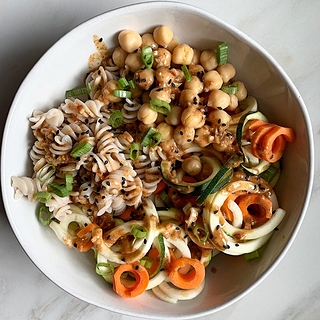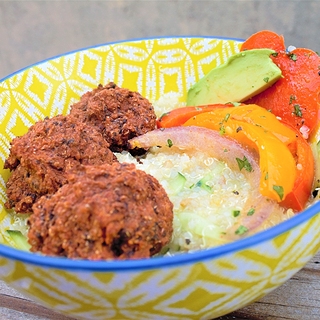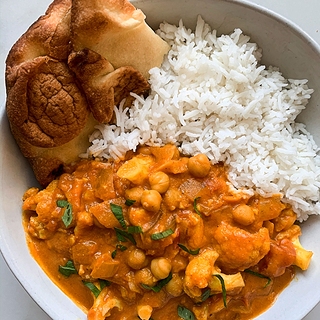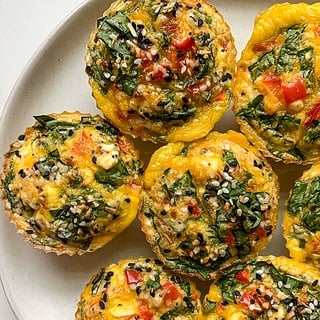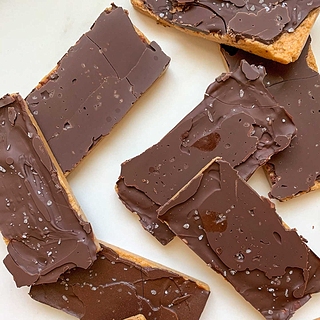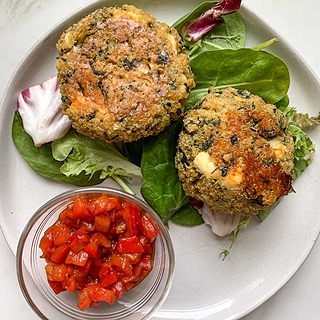Let us help you build the perfect Vegan/Vegetarian Meal Plan!
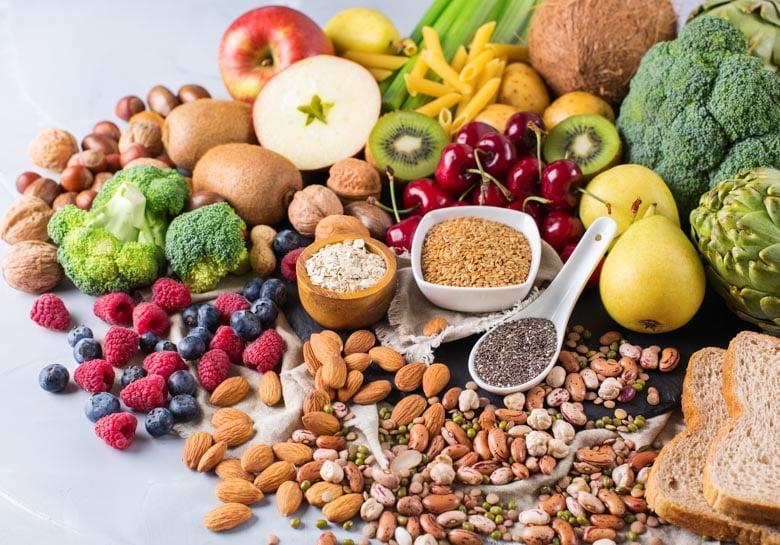
A Vegetarian Diet and/or Vegan Diet provides all of the nutrients you need, derived from plant-based resources.
Switch to a vegetarian or vegan diet without depriving yourself of the tastes and variety you love.
A plant-based lifestyle consists of food derived from plants such as fruits, vegetables, beans, nuts and seeds. A diet rich in plant-based foods and low in animal proteins may significantly benefit your health and improve your quality of life!
So you're considering a vegan or vegetarian lifestyle? Or, maybe you've been practicing it for a while and are making minor adjustments here and there. Some studies show that a plant-based approach can reduce risk of heart disease or Type 2 Diabetes. Other studies have found that a plant based diet can reduce the risk of cancer and improve brain health.
The keys to successfully implementing a vegan or vegetarian meal plan include:
- Eat a variety of fruits, vegetables, legumes, nuts, and starches
- Find a number of staple recipes and easy meals that you love
- Consider taking a multi-vitamin or supplement to replace animal-based nutrients
If you're committed to building a vegan meal plan or vegetarian meal plan the healthy way, you should be able to maintain a healthy weight, improve your metabolism, and reduce overall inflammation in your body. The Journal of the American Heart Association has found broad benefits, including improved overall cardiovascular health and lower mortality.
Why should I consider going vegan or vegetarian?
You may have heard that a vegan or vegetarian diet can help achieve weight loss and manage certain chronic diseases. Others choose a vegan lifestyle in an effort to be environmentally sustainable. Research suggests that reducing animal consumption by 50% can improve our food-related water footprint and reduce greenhouse gas emissions. Many people also have ethical reasons for cutting back on meat. No matter what your reason is, following a vegan lifestyle can improve your health outcomes and prevent your risk for chronic diseases such as cancer, diabetes, heart disease, Alzheimer’s, stroke, kidney disease, and chronic lower respiratory diseases such as COPD.
Try a Vegan Meal Plan or Vegetarian Meal Plan to set yourself up for success
Our step by step plans help you establish a healthy routine and stick to it!
Fine tune your Vegan / Vegetarian Lifestyle.
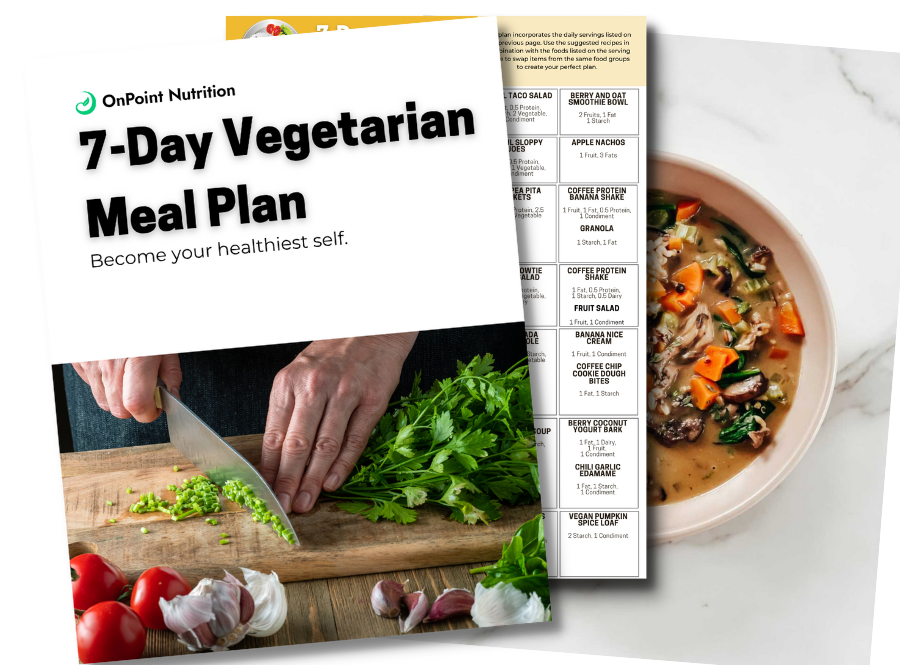
Will a Vegetarian / Vegan Diet help me manage my health conditions?
Can a vegan diet help with diabetes?
A plant-based lifestyle- eating more plants and fewer animal products- can improve your blood sugar and insulin sensitivity. Insulin resistance occurs when fat prevents insulin from letting glucose (sugar) into your muscle cells. This causes your blood sugar to rise.
Lower levels of fat in the blood, especially saturated fat, can improve insulin resistance. A vegan or vegetarian diet with the following characteristics can help with diabetes management:
- Whole carbohydrates
- High in fiber and protein
- Include fats in nuts and seeds
- Include fruits and vegetables
- Avoid processed foods and saturated fat
Many have even reversed their type 2 diabetes with a plant-based diet.
Build a vegan meal plan / vegetarian meal plan to include all vitamins and minerals
Make sure you replace the nutrients commonly found in meats and poultry
Although a plant-based diet can meet 100% of your nutritional needs, you should be aware of a few common nutrient deficiencies. The most common deficiencies include vitamin B-12, vitamin D and calcium. Eating a diet rich in these nutrients, or supplementing with vitamins and minerals, will help prevent these deficiencies.
If you are following a Vegan Meal Plan or Vegetarian Meal Plan, keep in mind these key nutrients.
|
Nutrients |
Food Sources |
|
Vitamin B-12 |
Dairy products and fish |
| Vitamin D Vitamin D, also known in the sunshine vitamin, is found in very few foods. We suggest incorporating a daily or weekly supplement. |
Fatty fish, eggs, fortified cereals, fortified nut-based milks |
| Calcium Calcium's main function it to keep our bones and teeth strong. It's a common misconception that calcium is only found in dairy products. |
Turnip and collard greens, kale, broccoli, sardines, soybeans, fortified cereals and grains, tofu |
| Choline Choline is involved in memory, muscle movement, regulating heartbeat and other basic functions. For vegans, It is best to find a multi-vitamin to replace natural choline sources |
Eggs |
How can a dietitian help you adopt a vegan or vegetarian lifestyle?
No matter what sparked your interest in a vegan or vegetarian lifestyle, it is so important that you have support along this process. A vegan dietitian will provide you the support you need to make this a sustainable change. A dietitian can support you throughout the process, helping you to build the skills to eat properly, plan ahead, navigate challenging situations, and create new habits. Your dietitian will also show you how to build vegetarian meals at restaurants. This process looks different for everyone; a dietitian will provide you an individualized plan for you to meet your specific goals.
Our team also helps you tackle the nitty gritty details of adopting a vegetarian or vegan diet. This includes meal planning and meal prepping. Read our full write up on how to meal prep for a vegetarian or vegan diet.

How to build a vegetarian meal plan or vegan meal plan
Try this three step plan and you'll be a vegetarian/vegan in no time
Try this:
-
First, replace all milk and dairy products with soy, rice, almond and hemp alternatives. Use nondairy yogurt or kefir and soy or coconut-milk coffee creamer.
-
Next, replace chicken, turkey, beef, pork, veal, lamb and fish with plant proteins.
-
Stock Up on legumes, beans, nuts, seeds and vegan meat alternatives like tofu veggie burgers, nutritional yeast, seitan and tempeh.
Be sure to include all four food groups at each meal — plant protein, fruit, vegetables and whole grain.
Having this foundational understanding of the food groups and vegan/vegetarian items within each food group will set you up for success.
Begin by planning out your vegan lunches. Our clients tell us that lunch is the hardest meal to plan for. We have many easy recipes that are easy to make and provide variety to your routine.
Then, build your dinner (for many, the evening is hectic) and breakfast around your schedule. Incorporate snacks when you know that you are likely to become hungry.
We have outlined our full approach to how to build a vegan meal plan on a dedicated page. Our step-by-step process includes a planning calendar to help you create a plan and stick to it. We can even help you plan to order a vegetarian meal while at a restaurant.
Try a Vegan Meal Plan or Vegetarian Meal Plan to set yourself up for success
Our step by step plans help you establish a healthy routine and stick to it!
Fine tune your Vegan / Vegetarian Lifestyle.
Download our 7 Day Meal Plan!
How to build your Vegan Meal Plan so that you stay "full"
Whether you are new to following a vegan meal plan or vegetarian meal plan, there are a few tricks that can help you feel satiated throughout the day. New vegans and vegetarians often do not eat enough food, so our first tip is to eat frequent small meals throughout the day. Below are a few tips to start, followed by a link to our full set of recommendations:
- Eat a snack before your larger meals. There are a ton of vegan and vegetarian snacks to choose from: edamame, peanut butter snack bars, and many more...
- Try to eat all your meals. Skipping meals will interfere with your body's normal cues for feeling full. Planning ahead around your work, school, or childcare schedule can help make sure you have enough food throughout the day
- Focus on fiber. Fiber helps you feel full. For example, a baked potato will satisfy you more than potato chips. Vegan / Vegetarian foods that are high in fiber include beans, tofu, tempeh, quinoa, lentils, and whole grains
- Consider taking a supplement to replace any nutrients you may have lost
- Make sure you're not thirsty! Sometimes your body's thirst cues will feel a lot like hunger. If you think you are feeling hungry more than usual, try drinking a glass of water (with lemon or lime to spice it up!) to see if your hunger dissipates
-
Take your time! Enjoy your food by eating it a bit more slowly!
Our full list of practical tips to help you stay feeling full on a vegan meal plan or vegetarian meal plan is posted here!
We help clients successfully implement vegan meal plans and vegetarian meal plans
If you are switching to a vegetarian meal plan or vegan meal plan, make sure you give your body with the proper mix of protein, carbohydrates, and fats
Many people tend to eat too many carbs and not enough protein when they switch to a vegan or vegetarian lifestyle.
Whether you are recently trying a plant-based lifestyle, or have practiced this approach for many years, it is critical to fuel your body with a healthy mix of macronutrients: protein, carbohydrates, and fats.
Meal prepping is a great way to make sure that you are getting enough of each macronutrient. Read our full write up on vegetarian meal prep.
We recommend that our clients focus on:
| Plant based sources of | Examples |
|---|---|
Protein: |
Read our full list of best protein sources for a vegan diet here. |
Carbohydrates |
Read our full page on the best carbohydrates for a vegan diet. |
Fats |
|
Many people don't know how much of each macronutrient their body needs. Our nutritionists build personalized vegan meal plans and vegetarian meal plans for each client.
Best Protein for a Vegan Diet
Protein is often a hot topic for vegetarians and vegans alike. When following a plant-based diet, it is crucial to understand why we need protein, and where it comes from. Each type of protein has a unique group that is called an amino acid; these groups are essential for chemical processes to take place in our bodies. There are nine specific amino acids that we must ingest through protein-rich foods because our bodies cannot make them.
The World Health Organization concludes that plant-based diets provide sufficient amounts of amino acids. To consume all of your essential amino acids, it is important to eat a variety of whole plant foods and to limit processed and refined foods.
Plant-based proteins have many benefits versus animal protein sources:
- Cholesterol-free
- Three times the fiber
- Minimal unsaturated fat
- Increased micronutrient density
Healthy vegan foods will likely contain both high quality carbohydrates and high quality protein. Our dietitians recommend a variety of foods to help you eat enough protein throughout the day.
Read our full write up on the best protein sources for a vegan diet to see our favorite tips and recipes.
Best Carbohydrates for a Vegan Diet
The best vegan carbohydrates come from unprocessed foods that contain complex carbohydrates. These foods include whole fruits, whole grains, non-starchy vegetables, and lentils/peas. While you may not be very experienced in cooking with these foods, we share our favorite recipes on our comprehensive page on the best carbohydrates for a vegan diet.
Best Snacks for a Vegan Diet
Don't forget your vegan snacks! Snacks are a key part of keeping you full in between meals. And because vegan foods are so calorically dense, their smaller portion sizes make it important to eat snacks throughout the day. Our favorite vegan snacks span food groups: from salty and savory peanut butter bars to salty edamame chili garlic edamame. Read our full list of best vegan snacks, along with links to their OnPoint recipes!
Don't Be a Junk Food Vegetarian / Vegan
Sudden appetite and poor planning can cause you to miss your goals
Plan based lifestyles can be very beneficial to your health. A 2006 scientific review found that people who followed vegetarian meal plans and vegan meal plans had lower rates of heart disease, high blood pressure, diabetes, and obesity.
Try to avoid these foods:
-
Processed foods such as white bread and white rice
-
Sugary foods, such as cakes, biscuits, and pastries
-
Processed vegan and vegetarian alternatives that may contain a lot of salt or sugar > vegan meat alternatives and some processed vegan drinks
-
Excess salt
Mediterranean Diet Vegan Meal Plans
If you're looking for a well-developed vegan meal plan, the Mediterranean approach may be perfect for you. Here’s why: both the vegan/vegetarian diet and the Mediterranean Diet emphasize fruits, vegetables, whole grains and heart-healthy fats (like olives and avocados). Both are abundant in nuts, beans, and whole grains, which provide you with high fiber and high-quality protein to help you feel satisfied and full of energy.
Read more about how to use the Mediterranean Diet to source delicious foods from all your favorite food groups here.
Download our favorite recipes
A vegan meal plan or vegetarian meal plan should include variety to keep things fun!
We provide clients with a variety of recipes, spanning different cuisine types and tastes, across all meals! Breakfast, lunch, dinner, we have you covered. Some of our favorite recipes include:
Our Favorite Vegan Breakfast, Vegan Lunches, and Vegan Dinners
Fill up on your favorite meals, balanced across protein, carbohydrates and healthy fats... we develop recipes to fit all taste palettes. Plus, all of these are easy to make and scale up or scale down to feed a family of any size, including one!
Vegan Breakfasts
- Peanut Butter and Banana Steel Cut Oatmeal
- Tofu Scramble
- Easy Overnight Oats
- Berry and Oat Smoothie Bowl
- Pumpkin Chocolate Chip Muffins
Vegan Lunches
- Vegetarian Bean Chili
- Asian Edamame Salad
- Sweet Chili Lime Tofu Bowls
- Lentil Sloppy Joe's
- Chickpea Quinoa Salad
Vegan Dinners
- Mushroom and Kale Pasta
- Crispy Chickpea Caesar Salad
- Crispy Tofu Stirfry
- Rainbow Roasted Vegetables
- White Bean and Kale Soup

Our Nutritionists Listen
Your preferences are unique to you. Your nutritionist tracks your food with you and makes specific recommendations to meet your goals.

A plan built just for you
Based upon your daily routine, we will build a custom plan to help you feel great using a vegan / vegetarian meal plan

Continuous Improvement
Success does not happen overnight. If something isn't working quite right, we make changes right away.
Questions? Contact Us!
“My team and I would be honored to be part of your health journey! Our priority is your health and happiness; no goal is too big or too small. We look forward to working with you soon!”




